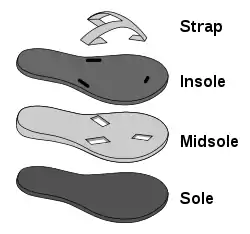sandal
English

Pronunciation
- IPA(key): /ˈsændəl/
Audio (Southern England) (file) - Rhymes: -ændəl
Etymology 1
From Middle English sandal (“sandal”), from Old French sandale, from Latin sandalium, from Ancient Greek σανδάλιον (sandálion), diminutive of σάνδαλον (sándalon, “sandal”), of unknown origin. Often mistakenly parsed as related to sand.
Noun
sandal (plural sandals)
Derived terms
Translations
| ||||||||
Etymology 2
From Middle English sandal (“sandalwood”), from Medieval Latin sandalum, from Byzantine Greek σάνδανον (sándanon), σάνταλον (sántalon), from Arabic صَنْدَل (ṣandal), from Middle Persian [script needed] (cndl /čandal/, “sandalwood”), from Sanskrit चन्दन (candana, “sandalwood”). Doublet of santalum.
Noun
sandal (uncountable)
- sandalwood
- 1847, Alfred Tennyson, “Prologue”, in The Princess: A Medley, London: Edward Moxon, […], →OCLC:
- And on the tables every clime and age / Jumbled together: celts and calumets, / Claymore and snow-shoe, toys in lava, fans / Of sandal, amber, ancient rosaries […]
Translations
Etymology 3
Arabic صَنْدَل (ṣandal), the same word as the shoe sandal, just applied for boats of the shape of this shoe.
Anagrams
Danish
Noun
sandal c (definite singular sandalen, indefinite plural sandaler, definite plural sandalerne)
- a sandal
Hausa
Middle English
Etymology 1
From Old French sandale, from Latin sandalium, from Ancient Greek σανδάλιον (sandálion).
Pronunciation
- IPA(key): /ˈsandal/, /ˈsandəl/, /ˈsɛndəl/
References
- “sandal, n.”, in MED Online, Ann Arbor, Mich.: University of Michigan, 2007, retrieved 2018-04-04.
Etymology 2
Borrowed from Medieval Latin sandalum, from Byzantine Greek σάνδανον (sándanon), σάνταλον (sántalon), from Arabic صَنْدَل (ṣandal), from Middle Persian [script needed] (cndl /čandal/, “sandalwood”), from Sanskrit चन्दन (candana, “sandalwood”). Doublet of saundres.
Pronunciation
- IPA(key): /ˈsandal/, /ˈsandəl/
Descendants
- English: sandal
References
- “sandal(e, n.”, in MED Online, Ann Arbor, Mich.: University of Michigan, 2007.
Norwegian Bokmål
Norwegian Nynorsk
Romanian
Declension
Swedish
Etymology
Borrowed from French sandale, from Ancient Greek σάνδαλον (sándalon).
Pronunciation
- IPA(key): /sanˈdɑːl/
Declension
| Declension of sandal | ||||
|---|---|---|---|---|
| Singular | Plural | |||
| Indefinite | Definite | Indefinite | Definite | |
| Nominative | sandal | sandalen | sandaler | sandalerna |
| Genitive | sandals | sandalens | sandalers | sandalernas |
Further reading
- sandal in Svenska Akademiens ordböcker
- sandal in Elof Hellquist, Svensk etymologisk ordbok (1st ed., 1922)
Anagrams
Tagalog
Etymology
Borrowed from Malay sandar, from Proto-Malayo-Polynesian *sandəʀ (“lean on or against”). Doublet of salig and sandig. See also sunday.
Pronunciation
- (Standard Tagalog) IPA(key): /sanˈdal/ [sɐnˈdal]
- Rhymes: -al
- Syllabification: san‧dal
Noun
sandál (Baybayin spelling ᜐᜈ᜔ᜇᜎ᜔)
Derived terms
- isandal
- magsandalan
- mapasandal
- pagkakasandal
- pagsandal
- pasandal
- pasandalin
- sandalan
- sumandal
Ternate

Etymology
Borrowed from Indonesian sandal, from Dutch sandaal, from Middle French sandale, from Old French sandale, from Latin sandalium, from Ancient Greek σανδάλιον (sandálion).
Pronunciation
- IPA(key): [sanˈdal]
References
- Rika Hayami-Allen (2001) A descriptive study of the language of Ternate, the northern Moluccas, Indonesia, University of Pittsburgh, page 29
Turkish
Etymology 1
From Ancient Greek σανδάλιον (sandálion).
Noun
sandal (definite accusative sandalı, plural sandallar)
- a small tropical tree of the Santalaceae family, Santalum album